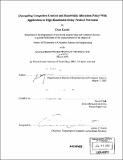Decoupling congestion control and bandwidth allocation policy with application to high bandwidth-delay product networks
Author(s)
Katabi, Dina, 1971-
DownloadFull printable version (9.114Mb)
Other Contributors
Massachusetts Institute of Technology. Dept. of Electrical Engineering and Computer Science.
Advisor
David Clark.
Terms of use
Metadata
Show full item recordAbstract
In this dissertation, we propose a new architecture for Internet congestion control that decouples the control of congestion from the bandwidth allocation policy. We show that the new protocol, called XCP, enables very large per-flow throughput (e.g., more than 1 Gb/s), which is unachievable using current congestion control. Additionally, we show via extensive simulations that XCP significantly improves the overall performance, reducing drop rate by three orders of magnitude, increasing utilization, decreasing queuing delay, and attaining fairness in a few RTTs. Using tools from control theory, we model XCP and demonstrate that, in steady state, it is stable for any capacity, delay, and number of sources. XCP does not maintain any per-flow state in routers and requires only a few CPU cycles per packet making it implementable in high-speed routers. Its flexible architecture facilitates the design and implementation of quality of service, such as guaranteed and proportional bandwidth allocations. Finally, XCP is amenable to gradual deployment.
Description
Thesis (Ph. D.)--Massachusetts Institute of Technology, Dept. of Electrical Engineering and Computer Science, 2003. Includes bibliographical references (p. 124-129).
Date issued
2003Department
Massachusetts Institute of Technology. Department of Electrical Engineering and Computer SciencePublisher
Massachusetts Institute of Technology
Keywords
Electrical Engineering and Computer Science.